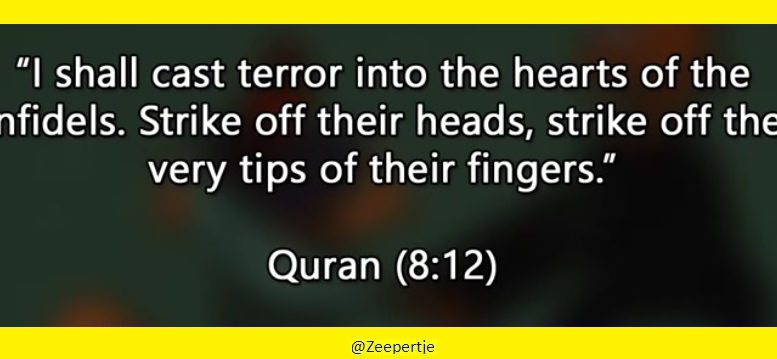Looking at the world of Islam, as I do, often, is like looking at a pit of depravity, oppression, horror and death. This pit has been dug by an ideology whose governing theology is full of contradictions, calls for hatred of other groups and is resolutely fascistic in the type of world it envisions. With roots like these is it any wonder that the fruit of the tree of Islam, as expressed in nations such as Pakistan, is so often rotten and poisonous.
But, to my great surprise and joy, there are signs that young people brought up in Muslim societies are questioning Islam to a much greater degree than they may have in the past. The cause of this questioning of Islam and how Islamic cultures and nations are managed is coming in part from education. According to a report in the Indian Telegraph, based on a new book by Hasan Suroor called ‘Who Killed Liberal Islam’ (ISBN-13: 978-9353335939) there is a ‘new generation of educated Muslims’ who are asking awkward questions about Islam. It appears that in many places, not just in the West, where Muslims are exposed to new ideas, but in the Islamic world, young people, and those not so young, are examining Islamic tenets and rejecting them either openly or secretly.
The article, quoting the book claims that whilst Islam has grown by 50% in the USA over the past decade, so also has grown the number of people rejecting Islam. The report states that Pew Research found that of those brought up in the USA as Muslims, 23% have rejected the ideology. This, the Indian Telegraph (h/t ROP) said, was not just a phenomenon affecting the young, but there were also much older apostates who hid their apostasy from more extreme and religious members of their family. Even in countries that have the death penalty for apostasy from Islam the figures for those rejecting Islam look stunningly high. The article states that a New Republic piece quoting a 2012 survey of Saudis found that the percentage of those who called themselves ‘convinced atheists’ was 5%. This survey also found that 19% of Saudis did not think of themselves as overly ‘religious’.
What could be happening here is that as Muslims, including those in Islamic nations, find that they can access more information about Islam from different sources, including critical and academic ones. This information is causing doubt about what they have been told by their Imams and other clerics. I also suspect that accurate translations of the Koran and the Hadith and other Islamic theological literature from classical Arabic into the mother tongues of those in various Muslim nations, is also driving this wave of apostasy. Muslims with questions about Islam no longer have to go to a library or to their mosque for access to these texts, they are available to many of them at the click of a mouse. Questioning Muslims can see for themselves that the Koran and the Hadith are stuffed full of exhortations to oppress women and have hatred for those outside of Islam. They are seeing this in a language that they understand and in many cases are rejecting what they have been told about Islam by their clerics and teachers.
The ability for Muslims to read Islamic scriptural and legal texts in a language they are familiar with could be as revolutionary as it was for Christians when vernacular language rather than Latin, became the language of the Bible. I can well imagine that there are a whole host of decent individuals of Islamic background who by finding out the truth about Islam, along with its core ideologies of hatred and jihad, become quite turned off of the idea of Islam as a whole.
It certainly seems, if the premise of the book is correct, that the Islamic world is on the cusp of great change and possibly change for the better. With the rise of unbelief in the Islamic world that could be signified by the claimed popularity of Richard Dawkins book, the God Delusion ( ISBN-13: 978-1784161927 ) in the Arab world, we could be seeing the sort of changes that set the Christian world on a path of religious and social pluralism start to take root in the Islamic world. However, because of modern communications technology, the time period for change may be much less than the 500+ years that elapsed between the first publication of the Bible in English by William Tyndale and Miles Coverdale in 1435, and the mid 20th century when Christianity became a faith of choice rather than compulsion. Better access to information means that ideas, including ideas that challenge Islam, can travel faster and more efficiently than ever they could in the past.
This must terrify those clerics and ‘community leaders’ who control Islam and by extension control those who believe in Islam. If a large number of even a majority of Muslims start to ask awkward questions about Islam, questions that religious leaders cannot answer honestly or clearly to the satisfaction of the questioner, then we could be seeing a mass exodus from Islam either to other faiths or to atheism.
The current existence of large numbers of questioning Muslims who either pay lip-service to Islam out of fear or who are quiet non believers, gives a lot of backing to my view that those opposed to Islam should not attack or harm individual Muslims but should instead go after this foul ideology called Islam. We do not know whether the person who may identify as Muslim really believes or are they hiding their apostasy from the wider world out of fear? This is similar to the idea that we do not know whether the person asking for help is or is not an angel in disguise. Those who attack individual Muslims using violence may well be assaulting the very hidden apostates that we should all be supporting as much as we can.
I must say that this book looks like it could be a really good read and I’m going to try, despite its expense to either buy a copy or see if my local public library could stock it. It could be a valuable source of information as to why Muslims are increasingly rejecting Islam totally rather than engaging in often failed attempts to reform an ideology that is difficult if not impossible to reform.





We can only hope or the future does not look good.